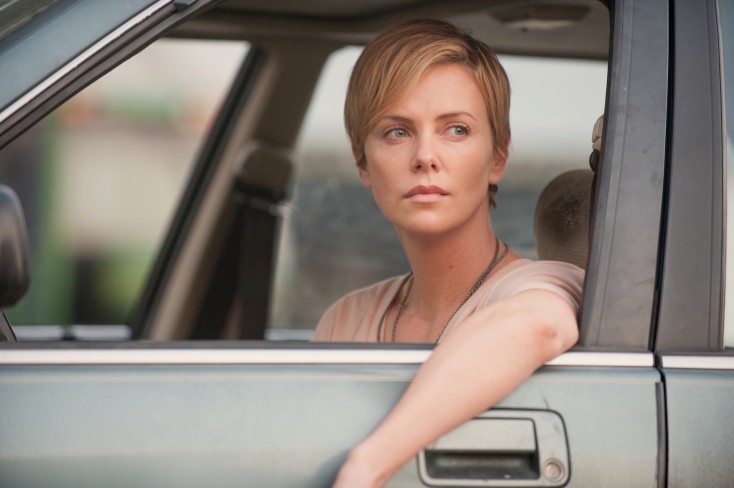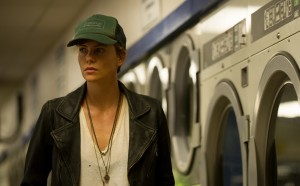By ANGELA DAWSON
Front Row Features
HOLLYWOOD—Charlize Theron (“Monster”) first became captivated with Gillian Flynn’s writing when she read her 2006 novel “Sharp Objects.” The Oscar-winning actress says she was fascinated with the way the author wrote female characters. So when she heard that a film adaptation of Flynn’s 2009 novel, “Dark Places,” was in the works, she knew she wanted to be a part of it.
She signed on to the project not only as the lead character, Libby Day, a woman who never recovered from a great personal tragedy as a child, she also got on board as a producer. This was before Flynn’s 2012 bestseller “Gone Girl” and the subsequent hit screen version starring Rosamund Pike and Ben Affleck became a blockbuster hit last year.
“Dark Places,” directed and adapted for the screen by French filmmaker Gilles Paquet-Brenner (“Sarah’s Key,” “Pretty Things”), is a twisted thriller that delves into the ambiguity of buried memories and our society’s obsession with sensational crimes.
Theron, who suffered a family tragedy at a young age, explained during a recent interview that her own experience was far different from what is depicted on screen. But she was interested in playing this fictional complex woman, who has been scarred ever since she witnessed the murder of her mother and sisters at the hands of her brother. In need of money, she agrees to revisit the scene of the crime and re-examine the evidence that led to her brother’s conviction thanks to her testimony with a group of amateur sleuths, who are willing to pay her for her time. In revisiting those long-buried memories, Libby (Theron) begins to confront the wrenching truths that led up to the horrific tragedy.
Like Truman Capote’s classic “In Cold Blood,” “Dark Places” is set in the Midwest with the brutal murders taking place on a small, isolated Kansas farm. But this drama plays out during the farming crisis of the 1980s, rather than the late 1950s. The story moves backwards and forward in time as the events of 30 years ago unfold alongside Libby’s revisiting the crime with the amateur sleuth members known as “The Kill Club.”
The stunning statuesque actress, who most recently starred in the blockbuster action remake “Mad Max: Fury Road,” acknowledges that while she doesn’t physically resemble the petite red-haired protagonist in Flynn’s novel, she is hopeful she was able to capture her spirit. The thriller reunites her with her “Mad Max” co-star Nicholas Hoult, and also stars Chloe Grace Moretz, Corey Stoll, Drea de Matteo and Christina Hendricks, who plays her doomed mother in the 1980s.
At a recent press day, Theron, who recently broke off her engagement to Oscar winner Sean Penn, was eager to talk about her newest film.
Q: Are you attracted to particular dark stories like this, angry troubled women? Is that something that speaks to you more?
Theron: Gillian (Flynn, the author) and I were talking about it this morning. It’s really interesting when you write and get to play a women that is layered and conflicted and has certain human attributes that might not be that attractive, which is part of the human condition that somehow. I think because we haven’t seen enough of it in cinema, it kind of sticks out like a sore thumb, and people comment on it (that way).
What we were talking about is—at the end of the day—they’re really compartmentalized characteristics. They really are just part of a full human being, especially a woman. It’s only in the last decade that we’ve seen woman who are as conflicted as men. So I can’t say that I’m attracted to angry, dark people. What I’m attracted to are characters that feel very truthful to the embodiment of a full woman. It’s just refreshing to see authors like Gillian write women like that and to be given the opportunity to play those women. It feels authentic and real.
Q: Libby Day’s experience is tragic. You also had tragic life experience. How much do you relate to this character’s life experience? How did it affect you and the project when you took it on to?
Theron: There really aren’t any similarities. The circumstances of this tragedy has absolutely nothing in common with the tragedy that happened in my life. I believe what people can relate to is that we all come from this family structure that we don’t get to choose, and I have yet to meet somebody that doesn’t have skeletons in their closet from the family life that they lived. There is something that is very relatable in the idea that you hit a certain age later in your life where you realize you have to kind of pick up the rug and see what’s underneath it and kind of deal with stuff. I think it’s a very easy assumption to make that because I had a very tragic event happen in my life that was why I wanted to make this story, and it couldn’t be further from the truth.
Q: We’ve seen more female-driven movies in the past couple of years than we have in a long time. Why do you think audiences are demanding more movies starring women in prominent roles? How can audiences help support female-driven movies?
Theron: It’s very simple: Go see them! People always say to me, “What’s wrong with Hollywood? They don’t want to make female-driven movies.” That is not where the problem lies. The problem lies in society. When we make these movies, nobody goes to see them. So it’s a social issue more than it is a Hollywood issue. It is a business at the end of the day and they make movies that they find there is an audience for. But I do think that there has been an incredible shift, especially in this last couple of years (toward more female-driven films).
I can definitely tell you that there was a definitive moment in my career where the more I started exploring these darker, ****** up characters, the more people were emotionally tapping into them because there was just something authentic about them. I remember doing a film with Jason Reitman (2011’s “Young Adult”), which was probably the most despicable character that I have ever played, and I remember that after every screening people would come up to me and say, “I know that character,” or “I am that character.” They would whisper it to me so nobody knew that they were saying it.
When you make a film like this, it is a bit like holding up a mirror to society. I think good filmmaking is when you really hold the mirror up truthfully and you don’t angle it, you don’t hide things with smoke and mirrors. I think women are starting to be represented that way and I think people are responding to it. It’s fun to watch women do that stuff. I remember when I started out, I wanted to be Jack Nicholson in “The Shining” and I wanted to be Robert De Niro in “Taxi Driver.”
For years, the women’s story has been associated with the soap opera, “chick flick” or the Madonna-whore (dynamic). We were really good hookers, and that was it. There was nothing in between.
Q: Would you like to appear in other adaptations of Gillian’s books?
Theron: (joking) We’ve talked about it. All of her characters are going to be 5-foot-10 and flat chested from now on. (She laughs.)
Q: You cast Christina Hendricks as the mother in this as a last-minute replacement for your original actress who dropped out.
Theron: Yes, it was the best decision Gilles and I made on the movie.
Q: This is your second movie to hit theaters this summer, and your co-star again is Nicholas Hoult. What was your working relationship like that made you want to work with him again?
Theron: (joking) Well, obviously terrible. (She laughs.)
Q: Do you see him as a younger brother or are you more just like friends or what?
Theron: Yeah, you know what? He’s just a really great guy and he’s incredibly talented. We joked around on “Mad Max: Fury Road.” We were kind of stuck in the same environment that entire film. We didn’t really have that much to do (in our downtime). We just really liked each other. And he makes making movies fun. There’s something about him that I thoroughly enjoy. He’s stupidly talented. I feel that way about him today. I would do every movie with him. He was the first person that I talked to Gilles (the director) about because I think this was one of the first scripts that I read when I came back from Namibia (where “Mad Max” was shot), and I was like, “This would be amazing if we could make this with Nick.” I think he was such a great asset to have.






